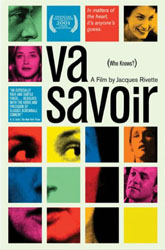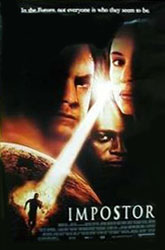 Director: Starring:
OTHER REVIEWS: Hiroshima,
Mon Amour Jules
et Jim Magnolia You Can
Count on Me |
Va Savoir BY: DAVID PERRY The Nouvelle Vague founders, Rivette, Godard, Truffaut, Chabrol, and Rohmer, had many interests in their creative fountains as they moved from film criticism to filmmaking. One was the idea of showing life as it is, the cinema verite side of movies -- films imitating life almost to the point that they seem conjoined. Va Savoir, the latest from Jacques Rivette, may have a high amount of contrivance and coincidence, but it also feels more lifelike than any romantic comedy to come out of Hollywood in ages. The film is light and nimble, more like the creation of Eric Rohmer than Jacques Rivette. The characters feel like they just came in from a stage comedy; not surprisingly, there are many connections between Va Savoir and Western stage productions. There are six major characters and they move between relationships that seem partly important, but also partly trivial. Here's a starter list: Cammille (Balibar) is a Paris-born actress coming home for two weeks with her acting troupe to perform Luigi Pirandelo's As You Desire Me. The troupe is an Italian one and their efforts seem useless to the Parisians, leaving most shows with just a third of the seats filled. Coming home for the first time in three years, she finds solace in her husband/director, the rabid Italian Ugo (Castellitto), who intends to use his time in the area to search for a lost Boldini manuscript that he might finally turn into a play for the first time. In town, she soon finds that there is still some attraction lying dormant in the heart of her ex-boyfriend, Pierre (Bonnaffe), a philosophy professor obsessed with his thesis on German philosopher Heidegger. His girlfriend, Sonia (Basler), has physically replaced Cammille in his life, even though his attraction to her does not equate what he still has for his ex. Sonia is a lithe ballet instructor with a past she would prefer keeping in the dark. Meanwhile, there's the Desprez siblings, whose enterence into the lives of these four create the needed contrivances for the movie to continue. Dominique (de Fougerolles) is the young, bibliotheca-loving beauty Ugo is drawn to. The Desprez family now houses the old library of the Boldini's best friend -- a place where Ugo is happy to spend his spare time looking for this sought play. The other sibling, Arthur (Todeschini), is a brooding and dark drifter, a complete departure from his sunny half-sister. Arthur is now in an affair with Sonia, but his intentions are for something other than interpersonal comfort. There are a collection of other characters -- an autograph expert (film director Claude Berri), the mother of the Desprez brood (Rouvel) -- but Va Savoir is almost completely about these six people. Rivette seems to be having fun playing with the farce he has created for them with co-writers Pascal Bonitzer and Christine Laurent -- so much that the film's 150-minute length seems much shorter. The audience is taken into the story and the time flies by. Like the Rohmer films, we are so happy to spend this time with these characters that, by the time Rivette closes the movie two and a half hours later, we don't want to leave them. As is often the case with Rivette, one of the strongest attributes of the film is the cast. Jeanne Balibar gives her petite character the look and fanciful whimsy of a French Audrey Hepburn; people have made that same comparison to Audrey Tautou in recent months, but as Balibar calmly walks across the roof of a Parisian apartment where she is stranded, a certain glean in her eyes definitely harkens back to the Sabrina star. I was also drawn to the way Sergio Castellitto's plays all his relationships. He is a courting kind with Dominique, an understanding shoulder with Cammille, a cautious wall with Arthur, and a size-comparing foil with Pierre. The late in the show duel he plans is especially enjoyable, creating the film's funniest moments and drawing a connection between two characters that was needed for the previous two hours. The camera stylings by Rivette are just as great here as they have been for 50 years. He is a devotee of long shots, the revelatory way a person's face can show less than meets the eye, and the inventiveness of improvisation. Everyone feels at home acting in front of him because, perhaps, the movie feels like it is just caught in a room watching all these people. Jacques Rivette has proven to be the French equivalent to our Robert Altman. Rivette's films are normally lugubrious excursions into the
emotional core of his characters. Joan the Maid, Love on the Ground, Celine
and Julie Go Boating, and L'Amour Fou employ the elliptical style and
narrative invention that mark much of his entries into the Nouvelle Vague. Since he worked
on the huge Lumière and Company cooperative in 1995, Rivette has only made two
films; unlike the now forgotten Secret Defense of 1998, Va Savoir has
the joy and happiness that seems refreshing for the 73-year-old dramatist. Is it a minor,
fluffy effort? Sure, but it's so damn fun getting to know these people through his lens. |




